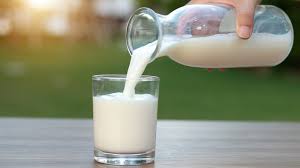
Breaking News
 The Hidden Secrets of Natural Milk
The Hidden Secrets of Natural Milk
 Diddy Trial Drama: Star Witness Vanishes Ahead Of Explosive Testimony
Diddy Trial Drama: Star Witness Vanishes Ahead Of Explosive Testimony
 PTSD treatment that excites a nerve in your neck wipes symptoms completely
PTSD treatment that excites a nerve in your neck wipes symptoms completely
 High-tech lactation pad measures medication in mothers' milk
High-tech lactation pad measures medication in mothers' milk
Top Tech News
 Cab-less truck glider leaps autonomously between road and rail
Cab-less truck glider leaps autonomously between road and rail
 Can Tesla DOJO Chips Pass Nvidia GPUs?
Can Tesla DOJO Chips Pass Nvidia GPUs?
 Iron-fortified lumber could be a greener alternative to steel beams
Iron-fortified lumber could be a greener alternative to steel beams
 One man, 856 venom hits, and the path to a universal snakebite cure
One man, 856 venom hits, and the path to a universal snakebite cure
 Dr. McCullough reveals cancer-fighting drug Big Pharma hopes you never hear about…
Dr. McCullough reveals cancer-fighting drug Big Pharma hopes you never hear about…
 EXCLUSIVE: Raytheon Whistleblower Who Exposed The Neutrino Earthquake Weapon In Antarctica...
EXCLUSIVE: Raytheon Whistleblower Who Exposed The Neutrino Earthquake Weapon In Antarctica...
 Doctors Say Injecting Gold Into Eyeballs Could Restore Lost Vision
Doctors Say Injecting Gold Into Eyeballs Could Restore Lost Vision
 Dark Matter: An 86-lb, 800-hp EV motor by Koenigsegg
Dark Matter: An 86-lb, 800-hp EV motor by Koenigsegg
 Spacetop puts a massive multi-window workspace in front of your eyes
Spacetop puts a massive multi-window workspace in front of your eyes
The Hidden Secrets of Natural Milk

A classic strategy in business is to replace something freely available with a patentable commodity everyone is then forced to purchase. Beyond this being highly exploitative, in many cases, the synthetic substitute is a poor imitation of what nature created and hence creates a myriad of problems for humanity.
This very much characterizes what happened to infant nutrition and allowed formula sales to become a 90.91 billion annual market. In turn, two major problems have followed the switch away from natural milk:
• Infant formula is full of unhealthy components that promote allergies and obesity (e.g., the first ingredient in formula is often corn syrup and then followed by seed oils—which remarkably federal law requires to be in infant formula due to a law based on flawed nutritional science from the 1960s that was never updated).
Breast milk was designed to be one of most nutritious foods a developing infant could have and contains many vital components which will never be possible to synthetically replicate.
Note: in some cases, the milk a mother produces is not enough for her infant. In those cases, a supplemental natural infant formula can be highly beneficial to her infant, but only if it is composed of natural ingredients which adequately provide the critical nutrients infants need and if it uses raw rather than pasteurized milk (as this preserves the vital nutrients milk contains and prevents it from turning into a potent allergen).
In this article, we will explore the numerous benefits of breastmilk, not just for the infant, but for the mother as well. We'll examine how the unique components of breastmilk contribute to a healthier immune system, stronger brain development, and even a reduced risk of chronic diseases later in life. Additionally, we'll look at how maternal health and diet impact the quality of breastmilk, highlighting the importance of support systems for mothers to ensure successful breastfeeding. Ultimately, the evidence supports what many already know: breastmilk is truly irreplaceable.

 Node without Consent
Node without Consent

